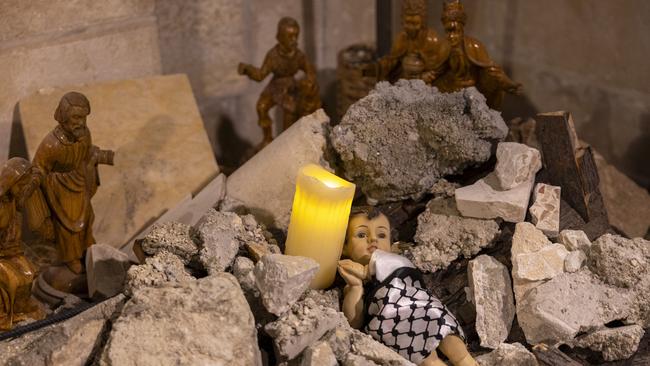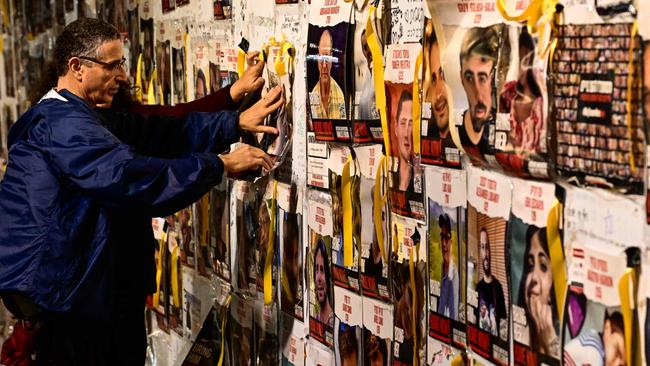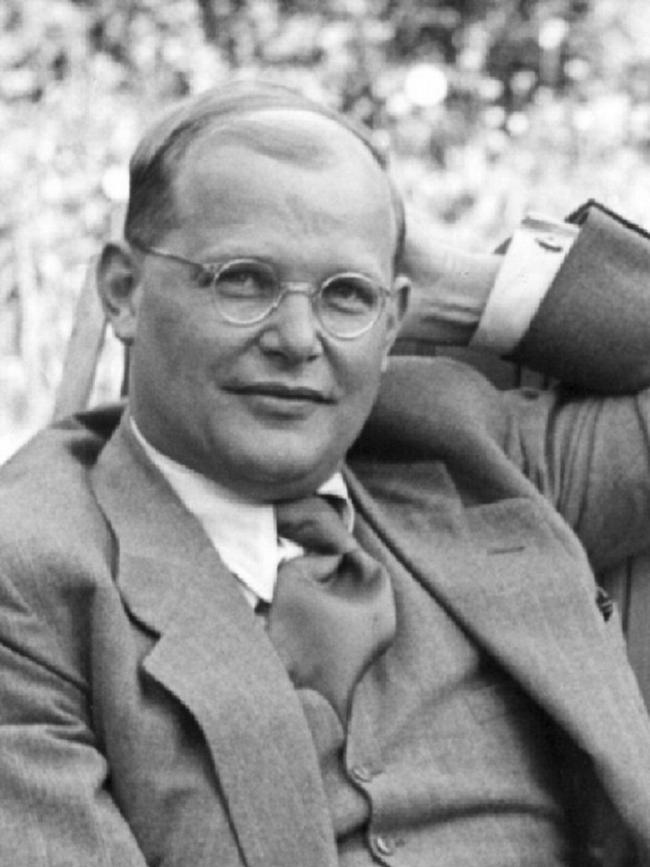
In the conventional nativity scene described in St Luke’s Gospel, the baby Jesus is wrapped in swaddling clothes and lies in a manger.
This year, in a photograph prominently displayed in the international woke press, a baby doll has been wrapped in the Palestinian keffiyeh and lies on broken breeze blocks and paving slabs.
Lutheran pastor Reverend Munther Isaac assembled this dispiriting tableau in Bethlehem’s Christmas Evangelical Lutheran Church. Jesus, claims Isaac, was “born among the occupied and marginalised. He is in solidarity with us in our pain and brokenness”. The true Christmas message, he continues, is that “this genocide must stop now”’. But the activists were not content with merely cancelling Christmas in Bethlehem this year.
They are determined to weaponise it, desecrating holy spaces, disrupting acts of worship and turning a story that is supremely sacred into something utterly profane.

Sacrilege of the nativity scene – purely for political purposes – was also on display in Melbourne on Christmas Eve at the Carols by Candlelight event broadcast to a national TV audience. A group of shallowly educated, morally jejune pro-Palestinian zealots decided it would be okay to storm the stage, insensitive to the spiritual beliefs of their fellow citizens or the presence of children entranced by the magic of Christmas.
It would be pointless to ask these deluded people to take a good, hard look in the mirror because they would only view themselves with undiminished admiration, revelling in the cheap grace they bestow upon themselves. The profanities committed in Bethlehem and Melbourne on Christmas Eve were not the worst sacrilege driven by the dogma of Islamism against the imagined enemy of Christianity.

Our minds go back to two terrorists who interrupted mass in the 16th-century church of Saint-Étienne-du-Rouvray in Normandy in July 2016. The attackers forced 85-year-old Father Jacques Hamel to kneel at the foot of the altar and then slit his throat while screaming “Allahu Akbar”. They, too, justified their actions by referring to perceived injustice in the Middle East, warning: “As long as there are bombs on Syria, we will continue our attacks.”
Yet even this cruel act occupies a modest position on the league table of barbarism; sadly, it is far from the most bestial act one human being is capable of delivering on another in pursuit of a supposedly higher cause. There appears to be no limit to human innovation when it comes to the field of torture and death.

The Hamas attacks of October 7 took methods pioneered by ISIS to a higher level. Hamas conducted beheadings, rapes, kidnappings and shootings on an industrial scale – the largest and most brutal slaughter of Jews since the Holocaust, but this time posted across social media.
The anti-Semitic, anti-Christian nativity defilers appear wilfully blind to the atrocities of that day. They lack the moral courage and intellect to wrestle with the challenge of how Israelis should respond to a terrorist administration on its border, which is committed to wiping a country and its people off the map. What painful trade-offs are demanded? What risks must be taken? These are not the questions with which they are prepared to grapple.
They are also insensitive to spiritual matters, to the message of grace and forgiveness in the Gospel narrative, wherein lies our best hope for peace in a sinful world.
In theology, grace is the watershed that separates Judaeo-Christian philosophy from other forms of religion. Grace, a spontaneous gift from God of divine favour, love and clemency, underpins the obligation to forgive our neighbours and confront our human failings.
It fosters an inward-blaming attitude, rather than the outward-blaming culture characteristic of Palestine where introspection is excused, and the blame for misfortune is attributed to others, frequently long dead.
Isaac claims expertise in Palestinian Theology and the Theology of Land. He is a leading figure in Kairos Palestine, which maintains that the presence of Israelis on Palestinian land is a sin against God and humanity.
He demands that the international community stand with the Palestinian people in their struggle against oppression, displacement and apartheid.

His philosophy of retribution and vengeance runs contrary to the teachings of Dietrich Bonhoeffer, a fellow Lutheran pastor, theologian and dissident. The Nazis imprisoned him for his opposition to Adolf Hitler’s euthanasia program and anti-Semitic persecution.
Isaac’s redrawing of Jesus’ suffering as a pastiche of Palestinian repression is a denial of Christ’s true sacrifice and suffering that Bonhoeffer would have categorised as cheap grace, “grace sold on the market” in which “the sacraments, the forgiveness of sin, and the consolations of religion are thrown away at cut prices”.
Forgiveness is a virtue that has been regrettably lacking in civil debate in 2023. It was absent from the discussion on the voice to parliament, replete with the narrative of historical injustice and racial guilt.
The two-state dream in the Middle East, the peaceful coexistence of separate Palestinian and Israeli nations, is impossible to realise without the clemency that would allow the discharging of historic debt. The viability of the two-state solution was all but destroyed by the events of October 7 and the desire by Hamas to repeat the atrocity.
In his 1937 book, Discipleship, Bonhoeffer wrote: “Christian love draws no distinction between one enemy and another, except that the more bitter our enemy’s hatred, the greater his need of love.
“Be his enmity political or religious, he has nothing to expect from a follower of Jesus but unqualified love.”
Such overt references to the message of the Gospel go against the zeitgeist in this aggressively secular age. They are all the more potent for that.






